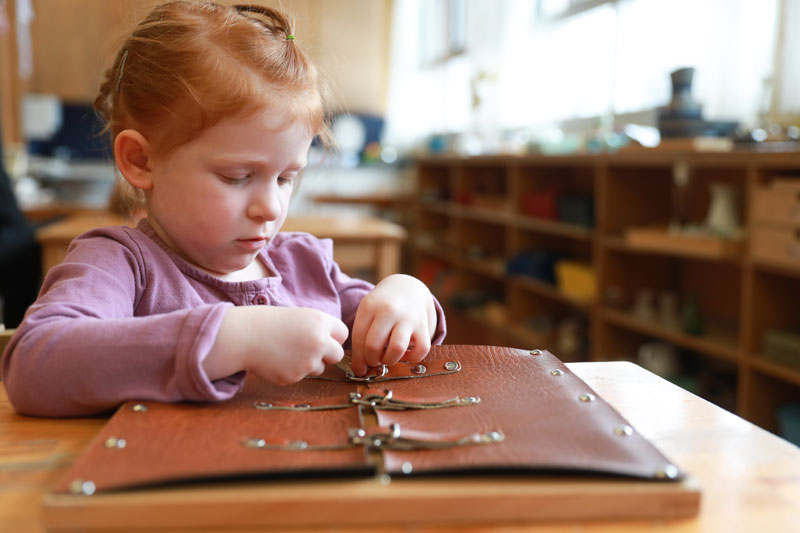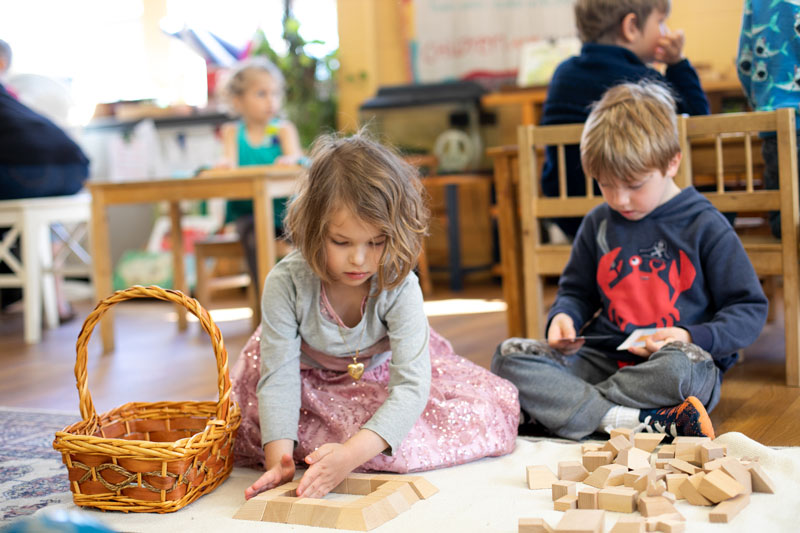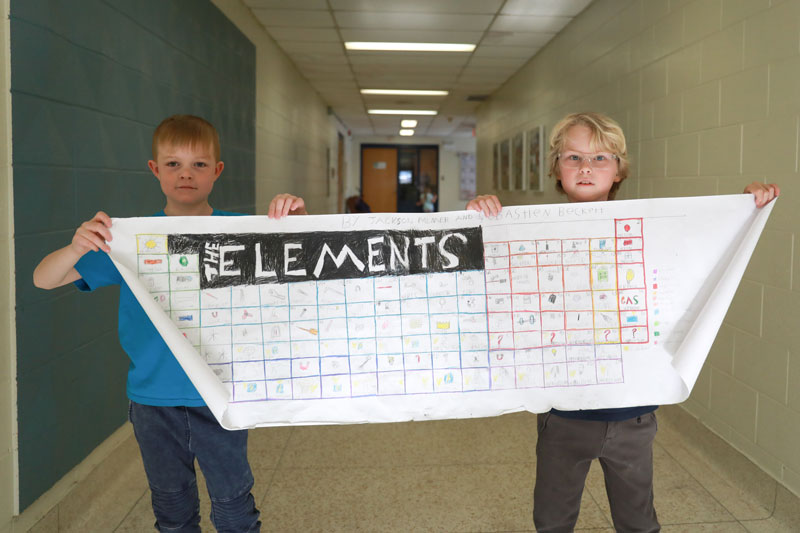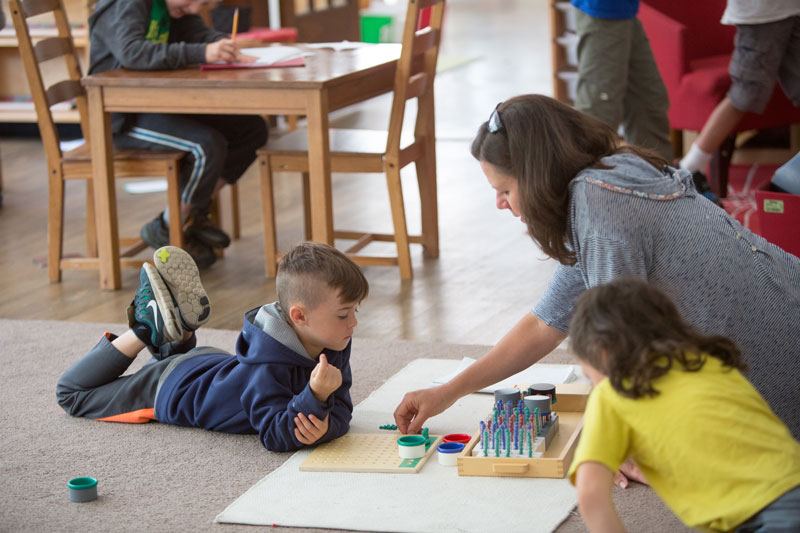Essential Qualities and Learning Outcomes of
Montessori education
The children are encouraged to develop qualities of citizenship and stewardship through an understanding and respect for cultural diversity and environmental awareness. The teacher shows an understanding of children’s progress and keeps clear and adequate records, as a continuous form of assessment.
A Child-Centred Environment

The focus of activity in the Montessori setting is on the child’s learning, not on the teacher’s teaching. There should be individual and small group lessons, with some opportunity for whole group activity.
- A Responsive, Prepared, Adaptive Environment
An environment responsive to the child’s emergent needs is one designed for their interests, abilities and potential. Nurturing is a critical aspect of the Toddler environment.
- Movement
Movement is an integral part of the environment for all ages and opportunities for freedom of gross motor movement and fine motor movement are essential. Recording their milestones and anecdotal reporting is central to programming for toddlers.
- Independence
Children strive to realize their own potential, and are provided with opportunities for problem solving and mastering their own skills at their own pace.
Children are able to choose their own work, become engaged, construct their knowledge and complete it to their satisfaction. They are able to continue their work for the pleasure of doing so.
In all age levels, guidance by the adults is given, or children are able to seek help when necessary in this process. Younger children are provided with opportunities to develop daily life skills which support their emerging independence.
Confidence and Competence
Younger children develop confidence and competence by engaging successfully in daily life skills. In the Preschool and older programs, the children should be able to manage the various materials with a clear sense of purpose, leading them to further understanding.
Academic Preparation
All children are acquiring skills appropriate to their age and stage, their interests, their abilities and potential.
Mixed Age Groupings

In order to respond to the diversity of individual children’s developmental needs, classes have a general three year age span with the exception of Toddler programmes as they may have a 12-18 month age difference.
Social Settings as a Community
Learning with and from each other develops the social skills within a mixed age setting. The emergent skills of the individual children come together to form the class community.
Younger children are provided opportunities to join group activities in order to support emergent social skills. Preschool or older children demonstrate social responsibility and leadership skills, such as empathy, communication, initiative, and resiliency.
Co-operation and Collaboration
Children are respected and encouraged to respect and support one another in their learning, and with their daily needs and experiences. There are opportunities to develop and practice qualities of peace and conflict resolution in their interactions with others.
Freedom within Limits
Freedom is given and earned. The freedom to choose their own activity comes with the responsibility for them to choose appropriately. Increasing levels of self-discipline and self-regulation are expected with the older children. The children explore and learn independently and construct “values” through social interaction.
Hands-On Experience with Materials

Children learn by actively working with the concrete materials and this leads to the development of abstract concepts in the older children.
Spontaneous Activity
Children spontaneously seek growth and development because it is in their nature to do so. The Montessori environment provides a setting in which children can explore, discover, and learn independently and with others with constant observation and assessment by the trained adults.
Joy
Children are allowed to be natural, and there are opportunities for spontaneity and expressions of the joy of learning.
Active Learning Methods
The Montessori environment is one in which children are actively engaged in their learning. They initiate their work and are encouraged to follow it through to completion. Movement with purpose and control is central to learning in Casa and Elementary.
Role Model and Guide

The teacher, sometimes called the directress, models the behaviours, values, and personal qualities, which reflect the essence of a Montessori classroom. They are resources for children to turn to for help in all areas of development. The teacher responds empathetically to the children’s feelings and needs, while firmly establishing limits for the group.
Observer
The teacher observes, reflects and plans for each child’s progress
Prepares the Environment
The teacher creates and facilitates a sense of order, attractiveness and nurtures a joy of learning.
Respectfully Engages the Learner
The teacher links the child to the environment, being aware of their cognitive and moral development, and the need to create a class community.
Approachability
The children are able to approach the teacher with ease and confidence, reflecting a personal connection and a sense of security. The teacher helps the children to manage the classroom expectations that have been established and to respond appropriately to re-direction. Older children should demonstrate a level of discipline with or without the direction and correction of an adult.
Encourages an Atmosphere that Supports the Development of Language and Self-Expression
Using clear, precise, rich language is an essential component of the classroom.The adult makes children aware of verbal and non-verbal cues. With the younger children, the development and support of language and self-expression is central to programming.
Recordkeeping of Children’s Progress
The teacher shows an understanding of children’s progress and keeps clear, consistent and timely records as a continuous form of assessment. These records include dated planning, recording children’s activities, and anecdotal comments on each child. Anecdotal records are observational notes recording anything of significance in the social, emotional or cognitive development of each child.
Social Awareness
The teacher aids children in acquiring qualities of citizenship and stewardship through an understanding and respect for cultural diversity and environmental awareness.
Establishes a Parent Partnership
The teacher establishes the communication that builds the trust and respect between home and school.


